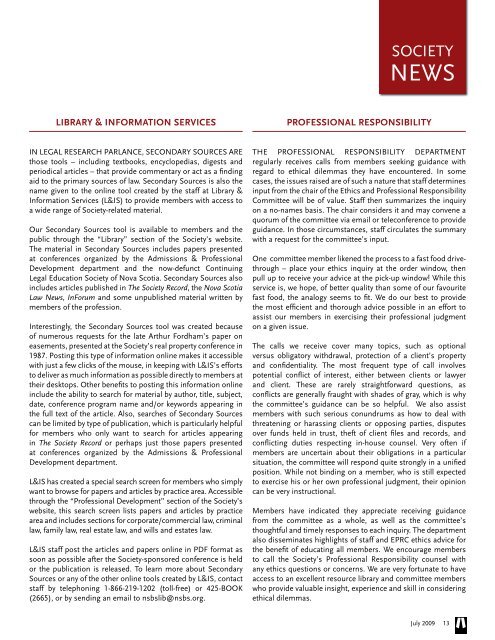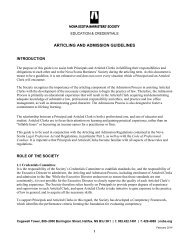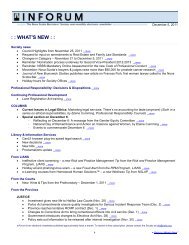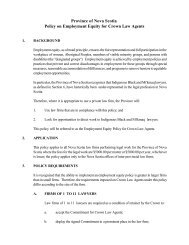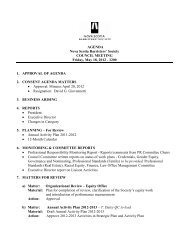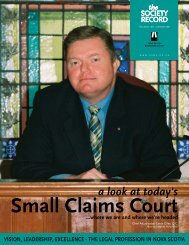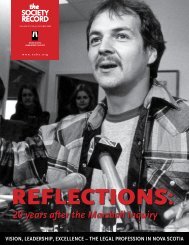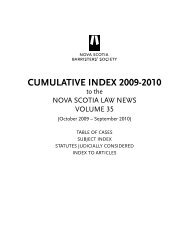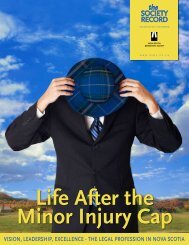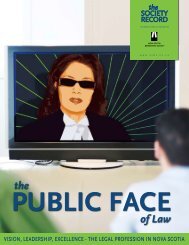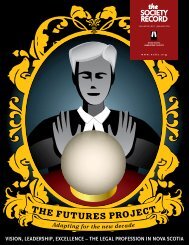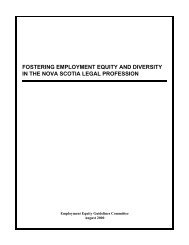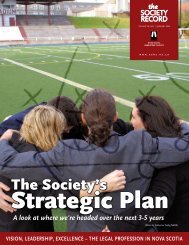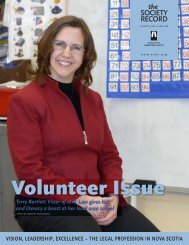SR Vol 27 No 3, July 2009 - Nova Scotia Barristers' Society
SR Vol 27 No 3, July 2009 - Nova Scotia Barristers' Society
SR Vol 27 No 3, July 2009 - Nova Scotia Barristers' Society
You also want an ePaper? Increase the reach of your titles
YUMPU automatically turns print PDFs into web optimized ePapers that Google loves.
society<br />
news<br />
Library & Information Services<br />
Professional Responsibility<br />
In legal research parlance, secondary sources are<br />
those tools – including textbooks, encyclopedias, digests and<br />
periodical articles – that provide commentary or act as a finding<br />
aid to the primary sources of law. Secondary Sources is also the<br />
name given to the online tool created by the staff at Library &<br />
Information Services (L&IS) to provide members with access to<br />
a wide range of <strong>Society</strong>-related material.<br />
Our Secondary Sources tool is available to members and the<br />
public through the “Library” section of the <strong>Society</strong>’s website.<br />
The material in Secondary Sources includes papers presented<br />
at conferences organized by the Admissions & Professional<br />
Development department and the now-defunct Continuing<br />
Legal Education <strong>Society</strong> of <strong>No</strong>va <strong>Scotia</strong>. Secondary Sources also<br />
includes articles published in The <strong>Society</strong> Record, the <strong>No</strong>va <strong>Scotia</strong><br />
Law News, InForum and some unpublished material written by<br />
members of the profession.<br />
Interestingly, the Secondary Sources tool was created because<br />
of numerous requests for the late Arthur Fordham’s paper on<br />
easements, presented at the <strong>Society</strong>’s real property conference in<br />
1987. Posting this type of information online makes it accessible<br />
with just a few clicks of the mouse, in keeping with L&IS’s efforts<br />
to deliver as much information as possible directly to members at<br />
their desktops. Other benefits to posting this information online<br />
include the ability to search for material by author, title, subject,<br />
date, conference program name and/or keywords appearing in<br />
the full text of the article. Also, searches of Secondary Sources<br />
can be limited by type of publication, which is particularly helpful<br />
for members who only want to search for articles appearing<br />
in The <strong>Society</strong> Record or perhaps just those papers presented<br />
at conferences organized by the Admissions & Professional<br />
Development department.<br />
L&IS has created a special search screen for members who simply<br />
want to browse for papers and articles by practice area. Accessible<br />
through the “Professional Development” section of the <strong>Society</strong>’s<br />
website, this search screen lists papers and articles by practice<br />
area and includes sections for corporate/commercial law, criminal<br />
law, family law, real estate law, and wills and estates law.<br />
L&IS staff post the articles and papers online in PDF format as<br />
soon as possible after the <strong>Society</strong>-sponsored conference is held<br />
or the publication is released. To learn more about Secondary<br />
Sources or any of the other online tools created by L&IS, contact<br />
staff by telephoning 1-866-219-1202 (toll-free) or 425-BOOK<br />
(2665), or by sending an email to nsbslib@nsbs.org.<br />
The Professional Responsibility Department<br />
regularly receives calls from members seeking guidance with<br />
regard to ethical dilemmas they have encountered. In some<br />
cases, the issues raised are of such a nature that staff determines<br />
input from the chair of the Ethics and Professional Responsibility<br />
Committee will be of value. Staff then summarizes the inquiry<br />
on a no-names basis. The chair considers it and may convene a<br />
quorum of the committee via email or teleconference to provide<br />
guidance. In those circumstances, staff circulates the summary<br />
with a request for the committee’s input.<br />
One committee member likened the process to a fast food drivethrough<br />
– place your ethics inquiry at the order window, then<br />
pull up to receive your advice at the pick-up window! While this<br />
service is, we hope, of better quality than some of our favourite<br />
fast food, the analogy seems to fit. We do our best to provide<br />
the most efficient and thorough advice possible in an effort to<br />
assist our members in exercising their professional judgment<br />
on a given issue.<br />
The calls we receive cover many topics, such as optional<br />
versus obligatory withdrawal, protection of a client’s property<br />
and confidentiality. The most frequent type of call involves<br />
potential conflict of interest, either between clients or lawyer<br />
and client. These are rarely straightforward questions, as<br />
conflicts are generally fraught with shades of gray, which is why<br />
the committee’s guidance can be so helpful. We also assist<br />
members with such serious conundrums as how to deal with<br />
threatening or harassing clients or opposing parties, disputes<br />
over funds held in trust, theft of client files and records, and<br />
conflicting duties respecting in-house counsel. Very often if<br />
members are uncertain about their obligations in a particular<br />
situation, the committee will respond quite strongly in a unified<br />
position. While not binding on a member, who is still expected<br />
to exercise his or her own professional judgment, their opinion<br />
can be very instructional.<br />
Members have indicated they appreciate receiving guidance<br />
from the committee as a whole, as well as the committee’s<br />
thoughtful and timely responses to each inquiry. The department<br />
also disseminates highlights of staff and EPRC ethics advice for<br />
the benefit of educating all members. We encourage members<br />
to call the <strong>Society</strong>’s Professional Responsibility counsel with<br />
any ethics questions or concerns. We are very fortunate to have<br />
access to an excellent resource library and committee members<br />
who provide valuable insight, experience and skill in considering<br />
ethical dilemmas.<br />
<strong>July</strong> <strong>2009</strong> 13


